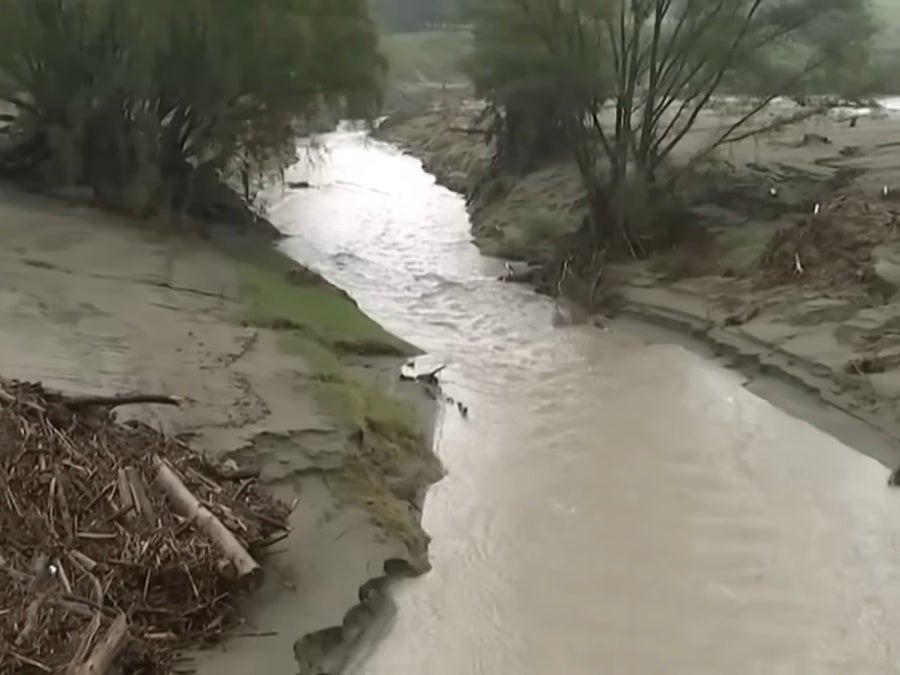
The cyclone that hit New Zealand’s North Island last month has left some vineyards looking “like a warzone”, one producer has said.
David Babich, CEO at Babich Winery, said vineyards are still full of silt and there are “acres and acres” of logging debris, a metre deep in places.
While the winery does not expect to feel a huge impact on overall yields, being largely Marlborough-based, Babich said the impact will be devastating for smaller producers.
Cyclone Gabrielle hit Hawke’s Bay and Gisborne, New Zealand’s second- and third-largest wine-producing regions, as winemakers were making final harvest preparations in February.
“We have five vineyards in Hawke’s Bay, and I was down there about two weeks ago, and it’s like a warzone. It’s quite incredible,” Babich told Just Drinks on a visit to London this week.
“You’re driving around, there’s silt everywhere. And then there will be an orchard with silt in it and other debris that’s clearly been washed in there. But also five or six cars on their roofs that have been washed in and they just haven’t got around to clearing them out.”
How well do you really know your competitors?
Access the most comprehensive Company Profiles on the market, powered by GlobalData. Save hours of research. Gain competitive edge.

Thank you!
Your download email will arrive shortly
Not ready to buy yet? Download a free sample
We are confident about the unique quality of our Company Profiles. However, we want you to make the most beneficial decision for your business, so we offer a free sample that you can download by submitting the below form
By GlobalDataA house on Babich’s Fernhill vineyard, which is bordered by the Ngaruroro river, was rolled off its foundations by a wave as the river burst its banks. Its tenants, in their sixties, were rescued by helicopter but the wave levelled the vineyard and an orchard beside it. “It’s pretty devastating,” Babich said. “We’ve had that vineyard for 30 years and it is unrecognisable.”
Eleven people have been reported dead and thousands were missing at the time of the cyclone but he said “it had the potential to be so much worse”.
Trade body New Zealand Winegrowers, which has set up a relief fund for winemakers, said the cyclone was a “major blow for affected growers and wineries”. While some were able to begin harvesting, CEO Philip Gregan added: “Those affected have a long road ahead of them to assess the damage, undertake the clean-up and consider their future.”
“I think they’ve calculated that the wine industry have lost 500ha of grapes,” Babich said. “The grape vines are not capable of being stood back up. They had nets on, so the nets are capturing all sorts of rubbish. There’s silt on it. There were 15 dead sheep in the [Fernhill] vineyard. We are just pulling the vines out.”
Babich is planning to replant vines in the same direction water travels in an attempt to minimise damage in case of future flooding.
While parts of the Fernhill vineyard survived the damage, the grapes cannot be harvested as it is too wet for tractors, there are no staff to pick by hand and the collection bins were swept away in the floodwater. “We’ve just written the crop off that whole vineyard,” he said.
The overall financial and supply impact for the company will be small, as around 90% of Babich’s vineyards are in Marlborough. “We won’t have a product gap… We will get about the right amount that we need but we won’t be making our premium Chardonnay for the first time this year – we’ve made that wine every year since 1985. The issue is just the quality. The grapes are there but the quality wasn’t there.
“With regard to continuity, we will have a shorter vintage of supply on things like Bordeaux reds and Syrah and even Chardonnay out of Hawke’s Bay because this is a challenging vintage and expectations aren’t very high. And we’ll just run with the ’21/22 vintages longer, launch ’24 sooner and bridge that. So continuity of supply will be unaffected I think for Babich.”
Meanwhile, for smaller producers the damage is “truly devastating”, Babich said. “From our perspective, losing that vineyard and volume is something we can easily take in our stride. So I’m not concerned about that from a Babich perspective. But I think, ‘What say this was my only vineyard?’ – then that would be truly devastating. And there are so many people in that situation. So I think there’s a lot of vulnerability which is coming to light. People have put everything into something that has now got a metre of silt on it.”
He said the winemaking areas of Dartmoor Valley and Esk Valley had “extreme volumes” of water, adding: “Four hundred millimetres in six hours. You just can’t deal with that.”
In terms of the harvest, he said: “I think generally 2023 is going to be a pretty tough vintage for Hawke’s Bay. But it might not have a strong effect on the supply side because wineries do carry stock of previous vintages. I don’t think there’s going to be a huge amount of the ultra-premium coming out because it would be so challenging.”



